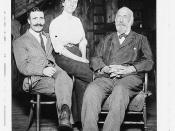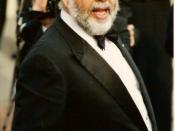Critical Analysis of Francis Ford Coppola's Apocalypse Now 11/17/00 The Vietnam War was fought in order to preserve democracy, restore peace, and prevent the Communist threat from taking over another country. However, once the fighting began the initial goal disappeared into the Vietnamese jungle. Francis Ford Coppola's Apocalypse Now portrays the confusion of the war in Vietnam through the eyes of Captain Benjamin L. Willard. He is sent on a mission with the objective to kill a Special Forces colonel, Walter E. Kurtz, who has disappeared into the jungles down a river outside Vietnam. Before Willard sets out on his mission, the viewer hears his commentary: "I was going to the worst place in the world and didn't even know it yet. Weeks away and hundreds of miles up a river that snaked through the war like a main circuit cable""plugged straight into Kurtz. It was no accident that I got to be the caretaker of Colonel Walter E. Kurtz's memory""anymore than being back in Saigon was an accident.
There is no way to tell his story without telling my own. And if his story is a confession, then so is mine."� (Apocalypse Now) Apocalypse Now draws parallels to the book it was based on, Heart of Darkness by Joseph Conrad. General Corman states the underlying theme in the movie during his briefing with Willard, "Out there with these natives it must be temptation to be God. "ÃÂCause there's a conflict in every human heart between the rational, irrational, between good and evil. And good does not always triumph."� (Apocalypse Now). Conflict dominates the plot of Apocalypse Now as the battle between good and evil rages through the jungle settings of Vietnam. Unfortunately, the good and evil are not particularly easy to tell apart as Willard makes his...

![1. Sen. Ben Tillman, 2. John E. Osborne, 3. J.B. Sanford, 4. P.L. Hall, 5. Governor [Woodrow] Wilson, 6. Norman Mack, 7. Willard Saulsbury, 8. J.E. Davies, 9. J.R. Mountcastle, 10. Cong. Talbott (LOC)](https://s.writework.com/uploads/8/89999/1-sen-ben-tillman-2-john-e-osborne-3-j-b-sanford-4-p-l-hall-thumb.jpg)
